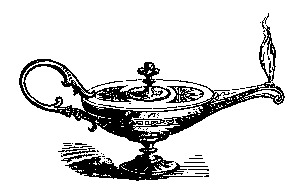SERMONS IN CANDLES:
BYC. H. SPURGEON.
Lecture 1
Continued...............Final
Let us get to our "Sermons in Candles" in real earnest. We will begin with the candle-light which we find in Holy Scripture.
The golden candlestick of the Tabernacle and Temple may hardly be mentioned in this place, for it was rather a seven-branched stand for oil lamps than for candles, Its representation on the arch of Titus at Rome is visible to all, and stands as all enduring testimony to the truth of Holy Scripture.
Our Lord walks among the golden candle-sticks of his churches; but these again are candelabra
or lamp-stands. In a country where olive oil abounded so much as in Palestine,
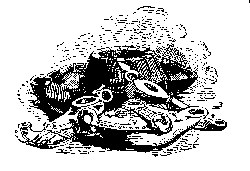 there was no need of the candle of our colder climate -- the
lamp being so readily supplied with the best of fuel. These lamps were of many forms; but what
mattered it, so long as their light was good? Many are the methods of the churches, but the main
thing is to shine with Gospel light.
there was no need of the candle of our colder climate -- the
lamp being so readily supplied with the best of fuel. These lamps were of many forms; but what
mattered it, so long as their light was good? Many are the methods of the churches, but the main
thing is to shine with Gospel light.
In the Word of God, we read of candles in different connections; but my previous remark applies to all the passages. The probability is that they all relate to lamps. That, however, shall not hinder me from speaking upon them. Candles are mentioned in relation to the character and condition of wicked men. Job (xviii. 6) says,-- "The light shall be dark in his tabernacle, and his candle shall be put out with him." His light never was that of the Sun of Righteousness, but he set up the candle of creature- comfort, that he might forget the night of his soul. Yet even this was but a temporary light, a mere candle which melted as it shone. God is against the ungodly man, and therefore, in due season, his very light will become darkness, and even his small joy will be gone like a candle which is blown out. In all cases a candle is doomed to cease its shining sooner or later. It comes to an end by gradual and natural consumption, even if all goes well with it; but in the case mentioned in the text, it is quenched by violence, or "put out." How great is the darkness of the sinner in such a case! If the believer has his candlestick of earthly comfort removed out of its place, his God still abides with him; and therefore he rejoices in heavenly light, and does not stumble; but when the ungodly lose their candle, they have lost all; and so Job adds, "The steps of his strength shall be straitened, and his own counsel shall cast him down." When the lamp goes out in the Arab tent, all is gloomy and desolate; and hence the misery which is symbolized by the quenching of the candle is great.
In another place Job (xxi. 17) says,-- "How oft is the candle of the wicked put out!" Suddenly the glory, the prosperity, yea, the very life of the wicked may come to an end. It has been so in hundreds of cases. Some think the passage means "How seldom!" rather than "How often!" Assuredly, the righteous have often considered providence to be slack in its dealings with the ungodly: but is it not great long-suffering which spares the guilty, in the hope of their repentance? Why should we grudge them a little candle-light, when, alas! they will so soon dwell in the outer darkness?
Job does not restrict this metaphor to the sons of evil, but uses it in reference to his own condition. Hear how he sighs (xxix. 2,3):-- "Oh that I were as in months past, as in the days when God preserved me; when his candle shined upon my head!" He had known prosperity, and that was gone! He had enjoyed heavenly fellowship, and that had been obscured. The candle of the Lord is a candle indeed. When that brightness is reflected from our faces, we are as happy as the angels in heaven; but when it is taken away, we sit in a darkness which may be felt. He who has once enjoyed fellowship with God will never again be happy without it. If we had remained in the blindness of nature, we should not have known the glory of divine love, nor should we have been in distress when a conscious sense of it is withdrawn; but now that we are enlightened by divine grace, darkness brings woe to us. When we lose the candle of the Lord, we imitate Job in sighing for its return.
David, who knew full well the brightness of that candle, and also knew the miss of it, jubilantly cries out in Psalm xviii. 28, "Thou wilt light my candle." The Scotch version well rhymes it:--
That it shall shine full bright:
The Lord my God will also make
My darkness to be light."
Believers shall not be left in the dark. If no servant comes to light our candle, the Lord himself will do it. What a mass of meaning can be packed away in one figurative expression! Matthew Henry, without the least straining of the metaphor, reads the passage thus: "Thou wilt revive and comfort my sorrowful spirit, and not leave me melancholy: thou wilt recover me out of my troubles, and restore me to peace and prosperity: thou wilt make my honour bright, which is now eclipsed; thou wilt guide my way, and make it plain before me, that I may avoid the snares laid for me; thou wilt light my candle. to work by, and give me an opportunity of serving thee and the interests of thy kingdom among men.."
Solomon spoke of a candle when he said, "The spirit of man is as the candle of the Lord, searching all the inward parts of the belly." Did he not refer to conscience? Did he not mean that conscience is in some respects a divine light -- "the candle of the Lord"? and in all respects a discovering light -- searching all the inward parts? Take care that you never trifle with this candle. A loss of light in the conscience means decrease of light for our whole manhood.
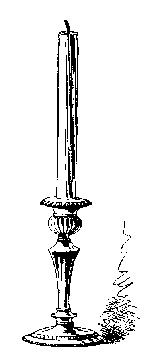 I am afraid that conscience in many persons has become no better than an unkindled candle, not
giving light, nor even making darkness visible. I have heard of a man who said, "Conscience!
Conscience! I have plenty of conscience." "Yes", said one, "and it is as good as new, for I have
never known you use it." In that case it was a candle unlighted, and the old rhyme has it:--
I am afraid that conscience in many persons has become no better than an unkindled candle, not
giving light, nor even making darkness visible. I have heard of a man who said, "Conscience!
Conscience! I have plenty of conscience." "Yes", said one, "and it is as good as new, for I have
never known you use it." In that case it was a candle unlighted, and the old rhyme has it:--
What profits it by day or night?"
An enlightened conscience is greatly to be prized, and it should be kept free from everything which might mar its brightness. Milton says:--
May sit i' the centre and enjoy bright day."
God grant that we may never do violence to our conscience even in the least degree; for this is to quench our own light!
Solomon mentions the candle in his graphic picture of the virtuous woman, who not only worked by day, but wrought far into the night, He says (Prov. xxxi. 18), "Her candle goeth not out by night." Many would have their hours shortened as to work, and lengthened as to sleep; but she did the very reverse. She lengthened her days by taking hours out of her nights. A wonderful example that woman was! I recollect hearing, when I was a boy, a minister preach about her from this text, "Who can find a virtuous woman? for her price is far above rubies." The opening of that memorable discourse was somewhat in this fashion:- "'Who can find a virtuous woman?' Why, anyone who chooses to look for her; and the only reason why Solomon could not find her was because he looked in the wrong place. Virtuous women kept clear of a king who had such a multitude of wives. But", said the preacher, "if Solomon were here now, and were made truly wise, he would not long ask -- "Who can find a virtuous woman?' He would join the church, and find himself at once among a band of holy women, whose adornment is a meek and quiet spirit. If he were permitted to look in upon the Dorcas meeting, he would see many of the sort of whom he once said, 'She stretcheth out her hand to the poor; yea, she reacheth forth her hands to the needy.' If he would adjourn to the Sunday-school, he would there meet with others of whom he would say, 'She openeth her mouth with wisdom; and in her tongue is the law of kindness.' We, who serve the Lord Jesus, meet many a time with virtuous women, of each of whom we could say with the wise king, 'Her price is far above rubies.'" The preacher of whom I have spoken interested me by the remark, "Why 'above rubies'? Why not above diamonds? My brethren, the diamond is but a pale and sickly stone, which needs the glare of candle-light or gas to set it off; but the ruby is a ruddy, healthy gem, which is beautiful by daylight. Lovely is the woman whose face is full of the glow of activity in domestic life. That is the kind of woman who makes the housewife in whom the heart of her husband safely trusteth." Whatever one may think of the correctness of the exposition, the sentiment of the preacher was sound and practical.
In Scripture the candle is mentioned whcn the destruction of a city is described. "Moreover I will take from them the voice of mirth, and the voice of gladness, the voice of the bridegroom, and the voice of the bride, the sound of the millstones, and the light of the candle" (Jeremiah xxv. 10). When no longer there were days of joy -- no festivals, no weddings -- then was the city brought low; but when the sound of the grinding of tbe meal by the millstone altogether ceased in the morning, and the light of the candle was no more to be seen in the evening', then was the city deserted, and left to be a desolation. If you passed a city on a hill, and saw no candle shining from any window, then you knew that the inhabitants had ceased. The description is as graphic as it is pictorial. The fate of the spiritual Babylon, or apostate Church, is set forth in the Book of Revelation, in the most solemn and sweeping terms: "And a mighty angel took up a stone like a great millstone, and cast it into the sea, saying, Thus with violence shall that great city Babylon be thrown down, and shall be found no more at all. And the voice of harpers, and musicians, and of pipers, and trumpeters, shall be heard no more at all in thee; and no craftsman, of whatsoever craft he be, shall be found any more in thee; and the sound of a millstone shall be heard no more at all in thee; and the light of a candle shall shine no more at all in thee" (Revelation xviii. 21-23). Who, that has read with care the story of the apostate church, can do other than rejoice with the holy apostles and prophets that God will thus deal with her?
The prophet Zephaniah, in his first chapter, at the twelfth verse, mentions candles in that memorable passage wherein he describes the overthrow of Jerusalem by the Babylonians: "I will search Jerusalem with candles." The same description might stand for the destruction of the city by the Romans; for Josephus tells us that princes, and priests, and mighty men were dragged even out of the sewers, and pits, and caves, and tombs, in which they had hidden themselves from fear of death. The imagery of the prophet well describes the conduct of soldiers when sacking a city. They not only seize all that they can see at once, or with a slight search; but, rightly judging that the people will have hidden their treasures, they ransack their darkest cellars and closets, and pry into their furniture; and, that they may see the better, they light many candles and look into every corner and cranny, so that nothing may escape them. Now, when God comes to search his church he will do it himself -- I will search Jerusalem"; and he will do it as minutely as spoilers in the hour of sack. He will find out every hypocrite, "and punish the men that are settled on their lees; that say in their heart, The Lord will not do good, neither will he do evil." Ah me! if the Lord thus examines our churches; if he comes to close work with men's souls, and searches with candles to find out their condition; shall we be able to endure an investigation so thorough, so minute, so all-discovering?
When we reach the New Testament, we remember our Saviour's words: "Neither do men light a candle, and put it under a bushel, but on a candlestick; and it giveth light unto all that are in the house": Matthew v. 15. Grace is meant to be seen: to conceal it is contrary to common sense. Our Lord also speaks of a high degree of grace in Luke xi. 36, "If thy whole body therefore be full of light, having no part dark, the whole shall be full of light, as when the bright shining of a candle doth give thee light?' How blessed to have "no part dark"! To have "the whole full of light"! This is no dim twinkling, but "the bright shining of a candle", or rather of "a lamp", whereby all in the room are made glad. What a beautiful condition of heart! But we ought all to possess it; for darkness is a work of the devil, and all the devil's works our Lord Jesus has come to destroy. God grant that the whole of our being may be irradiated with the brightness of his grace! Then we shall have nothing to conceal, and nothing around us will lie in darkness. Our houses will be lit up with glory, and the bells on the horses, and the vessels of our dwellings will reflect the brightness of our consecrated lives. Alas, that so many who have a measure of divine knowledge and grace, yet have some part of their nature still in the darkness! You cannot help noticing that their sanctification is partial. Perhaps it will be the wiser course to keep our eyes at home, and pray the Lord to enlighten our darkness, that we may, ourselves, shine as lights in the world.
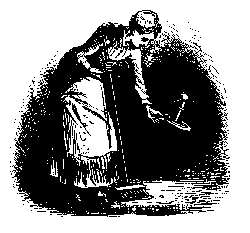 Remember, also, the remarkable parable of the woman who had lost her piece of money. The
question is put in Luke xv 8, "What woman having ten pieces of silver, if she lose one piece, doth
not light a candle, and sweep the house, and seek diligently till she find it?" In this way must we
look for lost souls, with the light of the gospel and the bosom of the law. You must be at some
expense if you would find the lost! You must light a candle, and let it be burnt up. You must make
a little dust, too; for nothing worth doing will be accomplished without a stir. Yet dust making
is not all. Certain people seem to think that you will find all the lost pieces of money by merely
making dust enough and noise enough; but they are wrong. There must be more light than dust.
Nothing can be done without the light of the candle. Instruction must be given, as well as
excitement created. A little dust is a good sign, for it shows that the lethargic order is being
disturbed, and old things are passing away; but, at the same time, we must not make so much dust
that we cannot see by the light of our candle. Indeed, we must not be content either with the dust
or the light; we may not rest till we spy out our lost treasure, sad place it in safety. Use the candle
more than the broom. Be not negligent as to either; but keep your eye open to find the money.
Remember, also, the remarkable parable of the woman who had lost her piece of money. The
question is put in Luke xv 8, "What woman having ten pieces of silver, if she lose one piece, doth
not light a candle, and sweep the house, and seek diligently till she find it?" In this way must we
look for lost souls, with the light of the gospel and the bosom of the law. You must be at some
expense if you would find the lost! You must light a candle, and let it be burnt up. You must make
a little dust, too; for nothing worth doing will be accomplished without a stir. Yet dust making
is not all. Certain people seem to think that you will find all the lost pieces of money by merely
making dust enough and noise enough; but they are wrong. There must be more light than dust.
Nothing can be done without the light of the candle. Instruction must be given, as well as
excitement created. A little dust is a good sign, for it shows that the lethargic order is being
disturbed, and old things are passing away; but, at the same time, we must not make so much dust
that we cannot see by the light of our candle. Indeed, we must not be content either with the dust
or the light; we may not rest till we spy out our lost treasure, sad place it in safety. Use the candle
more than the broom. Be not negligent as to either; but keep your eye open to find the money.
There is even a connection between candles and heaven, though it is of a negative kind; for there "They need no candle, neither light of the sun": Revelation xxii. 5. Here on earth creature-comforts yield us their candlelight; but there the Creator himself will fill us with his own presence, and we shall no more need these temporal blessings than a man requires a candle at noon-day. How soon may we be privileged to know how bright is the place where '"the Lord God giveth them light"! Thus the Scripture is not without its "sermons in candles", as I have shown you.
One allusion I will venture to mention, though the word employed is " lamp." David says, "Thy
Word is a lamp unto my feet, and a light unto my path": Psalm cxix. 105. David drew his
comparison from what is seen every night in an Oriental city. He who goes out into the street at
night in Eastern towns is bound to carry a lantern with him. You would find it very necessary if
you were there, if only because of the dogs who prowl about for their living. They are very fond
of shin bones, and they do not like them any the less if they happen to be alive, with a little meat
upon them. A light may keep them off. Besides that, there are open gutters, and heaps of filth, and
nobody knows the abominations of the unspeakable Turk and his cousins in the East. You must,
therefore, when you go out at night, carry a lantern, for your own protection; and the law, also,
compels yon to do so. If you are out without a lantern, the police put you down as an individual
who is abroad with ill design.
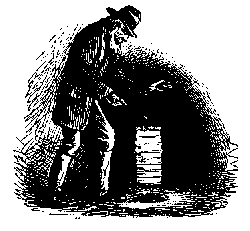 The very common lantern, which children are so pleased, is a fair specimen of what are used at
this day, and therefore it resembles what David used; for fixings in the East undergo little or no
change. The proper use of such a lantern was to guide the feet, and this is the use of the Word of
God. Certain brethren hold it up so as to see the stars, hoping to find out what is going to happen
next week, or next year. How great they are over seals and trumpets! One admires the depth and
the darkness of their research. We may leave them to their discoveries: time will show whether
they are correct or not.
The very common lantern, which children are so pleased, is a fair specimen of what are used at
this day, and therefore it resembles what David used; for fixings in the East undergo little or no
change. The proper use of such a lantern was to guide the feet, and this is the use of the Word of
God. Certain brethren hold it up so as to see the stars, hoping to find out what is going to happen
next week, or next year. How great they are over seals and trumpets! One admires the depth and
the darkness of their research. We may leave them to their discoveries: time will show whether
they are correct or not.
Others hold the heavenly light where its only use would be to minister warmth and comfort to the heart: these we do not blame, unless they forget other matters. David made a practical use of the sacred light: he held it where it would shine upon his way, and enable him to keep out of foul places, and walk in a clean path. The Bible is a blessing to us in many ways; but he is wisest who makes it his "Every-day Book", and rules his family life and his business life by its holy precepts. Read the prophecies, prize the promises, but fail not, by God's grace, to practise the precepts.
Many people use their Bibles as lights to be hung up at a Chinese feast of lanterns, for amusement, or for show. Their theology is a brilliant advertisement of their information; their Biblical studies make their conversation attractive; but bona fide practical godliness they fight shy of. They prefer the Book of Revelation to the Sermon on the Mount. Very general is this unpractical treatment of Holy Scripture. have you not heard of the "Golden Rule"? A wonderful precept is that Golden Rule, and I am sure you all admire it. I have been told, that one day the Golden Rule wandered out of church into the Stock Exchange, got its hat knocked over its eyes, and was led out by the beadle, who asked, "What could have induced you to come here? What business have you out of church? You are neither a bull nor a bear." The jobbers and brokers could not do their business with this precious Golden Rule prying about; for its teaching did not allow latitude enough to either buyers or sellers. Perhaps I am mistaken. I am not sure that it was the Stock Exchange; on second thoughts, it may have been the Coal Exchange, or possibly Mark Lane. I am getting a little mixed. I wonder whether it was the Cattle Market, or Covent Garden, or Mincing Lane. Perhaps, after all, I am in error, and it was your shop. But this I do know, that the Golden Rule is always highly respected when it keeps itself to itself; but if it meddles with tradespeople, they say, "Business is business": to which I would reply, "And business has no business to be such business as it often is." The Golden Rule in business generally is, "Do others, or others will do you." But the Word of God speaks in nobler fashion. Scripture lays down by-laws which the most of men treat with respectful negligence: they have no objection to the light and comfort of Scripture in sickness, sorrow, or death; but they want it not in their everyday walks in the City. This is not as it should be. Use you the light of God every day and all the day.
It is time to quit these Scriptural allusions, and come to the work of presenting emblems and illustrations. I will begin by borrowing. I dare say you have seen a little, square, podgy book, as broad as it is long; very much like a smaller Bradshaw's Railway Guide: I refer to Quarles' School of the Heart. If ever you have been shut up in a remote farmhouse, where there was nothing to read except the almanack for the year 1843, when you had read that through three times, and had picked over Buchan's Family Medicine, you were driven at last to this quaint old book of uncouth cuts and rhymes. It is an immortal work, and, despite the critics, it has true poetry in it, though its metaphors are often grotesque and strained. Towards the end you find certain emblems made from candles; and I have put seven of them together to set forth the "Seven Ages of Man? This first candle, long and slender, is the child, which, if spared, has quite a length of light and life before it.
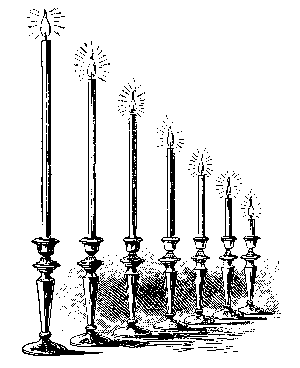 When newly lighted the flame is easily blown out, but there are large possibilities of continuance.
So also at twenty we anticipate long years of life, and yet it may end in one short hour. The other
candles show us as thirty, forty, fifty, sixty, seventy years of age. Our figure goes no further, "for
if by reason of strength they be fourscore years, yet is their strength labour and sorrow."
When newly lighted the flame is easily blown out, but there are large possibilities of continuance.
So also at twenty we anticipate long years of life, and yet it may end in one short hour. The other
candles show us as thirty, forty, fifty, sixty, seventy years of age. Our figure goes no further, "for
if by reason of strength they be fourscore years, yet is their strength labour and sorrow."
Look at this shining emblem, and judge each one his own position as to his remainder of life. Mark how little is left to some of you! Pray God that you may use all that remains to the praise of God. I asked concerning a sick friend the other day, and the answer I received was a shake of the head, and the remark, "I am sorry to say, he cannot last much longer. It is only a matter of time: his life hangs on a thread." I answered, "And that is exactly the case with me." Is it not true of every one of us that we are mortal? and that our departure is only a matter of time? Our life is ended as easily as a candle is blown out.
Here is a facsimile of Quarles' quaint wood-cut, whereby he tried to set forth the eagerness of Death to quench the light of life, and the way in which Time, for a season, holds back the hand of the last enemy.
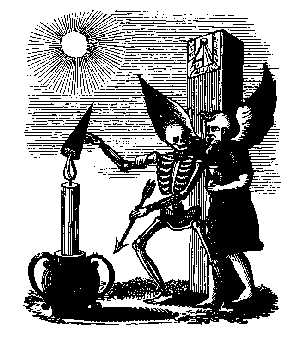 Quarles has written many books, and he frequently brings in candlelight. Having
introduced him, I leave you to make his further acquaintance as your taste directs.
Quarles has written many books, and he frequently brings in candlelight. Having
introduced him, I leave you to make his further acquaintance as your taste directs.
Robert Farlie has given us some capital emblems, and there is a reproduction of them in a fine volume in which his work is intermingled with that of Jacob Calts. It was published as a Christmas book by Longmans.
Gotthold has quite a series of Candle emblems. Here is the first one:--
"Gotthold, wishing to seal a letter, called for a lighted candle. The maid obeyed his orders; but proceeding too hastily, the flame, which had not yet gathered sufficient strength, went out. Here, said Gotthold, we have that which may well remind us of the gentleness and moderation to be observed in our comportment towards weak and erring brethren. Had this candle, when first lighted, been carried slowly, and shaded by the hand from the air, it would not have been extinguished, but would soon have burned with rigour. In like manner, many a weak brother might be set right, if we only came to his help in the right way, and with kindly advice. It is not by violent strokes that you reduce the dislocated limb. Christ himself does not quench the smoking flax, but blows upon it with the gentle breath of the blessed words that proceed out of his mouth (Luke iv. 22); and this was the reason why disconsolate sinners flocked around, and pressed upon him, to hear what he said. Luke v. 1; xv. 1."
But you will soon be weary of me if I do not bring to an end this first part of my "Sermons in Candles." I will close with a short meditation, from quaint Bishop Hall, and a rhyme from Master John Bunyan. The Bishop, whose wording I have a little altered, has a Contemplation under the heading of--
"ON OCCASION OF THE LIGHTS BROUGHT IN."
"Well as we love the light, we are wont to salute it, at its first coming in, with winking or closed eyes; as not abiding to see that without which we cannot see. All sudden changes, though for the better, have a kind of trouble attending them. By how much more excellent any object is, by so much more is our weak sense mis-affected in the first apprehending of it.
"O Lord, if thou shouldest manifest thy glorious presence to us here, we should be confounded at the sight of it? How wisely, how mercifully hast thou reserved that for our glorified estate; where no infirmity shall dazzle our eyes; where perfect righteousness shall give us perfect boldness both of sight and fruition!"
Master Bunyan gives us a world of thought in the doggerel rhyme with which I end this first lesson.
Man's like a candle in a candlestick,
We manage candles when they take the fire;
Again, though it may seem to some a riddle,
As candles in the wind are apt to flare,
The candle in the night doth all extol,
But candles that do blink within the socket,
But let us draw towards the candle's end.
Made up of tallow and a little wick;
And as the candle is before 'tis lighted,
Just such be they who are in sin benighted.
Nor can a man his soul with grace inspire,
More than can candles see themselves on fire.
Candles receive their light from what they are not;
Men, grace from Him, for whom at first they care not.
God ruleth men, when grace doth them inspire.
As biggest candles give the better light,
So grace on biggest sinner's shines most bright.
The candle shines to make another see;
A saint unto his neighbour light should be.
The blinking candle we do much despise;
Saints dim of light are high in no man's eyes.
We used to light our candle at the middle.
True, light doth at the candle's end appear,
And grace the heart first reaches by the ear;
But 'tis the wick the fire doth kindle on,
As 'tis the heart that grace first works upon.
Thus both do fasten upon what's the main,
And so their life and vigour do maintain.
So Christians in a tempest to despair.
We see the flame with smoke attended is;
And in our holy lives there's much amiss.
Sometimes a thief will candle-light annoy:
And lusts do seek our graces to destroy.
What brackish is will make a candle sputter;
'Twixt sin and grace there's oft a heavy clutter.
Sometimes the light burns dim, 'cause of the snuff,
And sometimes 'tis extinguish'd with a puff:
But watchfulness preventeth both these evils,
Keeps candles light, and grace in spite of devils.
But let not snuffs nor puffs make us to doubt;
Our candle may be lighted, though puff'd out.
Nor sun, nor moon nor stars then shine so well:
So is the Christian in our hemisphere,
Whose light shows others how their course to steer.
When candles are put out all's in confusion;
Where Christians are not, devils make intrusion.
They then are happy who such candles have;
All others dwell in darkness and the grave.
And saints whose eyes are always in their pocket,
Are much alike; such candles make us fumble;
And at such saints, good men and bad do stumble.
Good candles don't offend, except sore eyes,
Nor hurt, unless it be the silly flies.
How good are shining candles in the night!
How sweet is holy living for delight!
The fire, you see, doth wick and tallow spend;
So wastes man's life, until his glass is run,
And so the candle and the man are done.
The man now lays him down upon his bed;
The wick yields up its fire, and so is dead.
The candle now extinct is, but the man
By grace mounts up to glory, there to stand.
